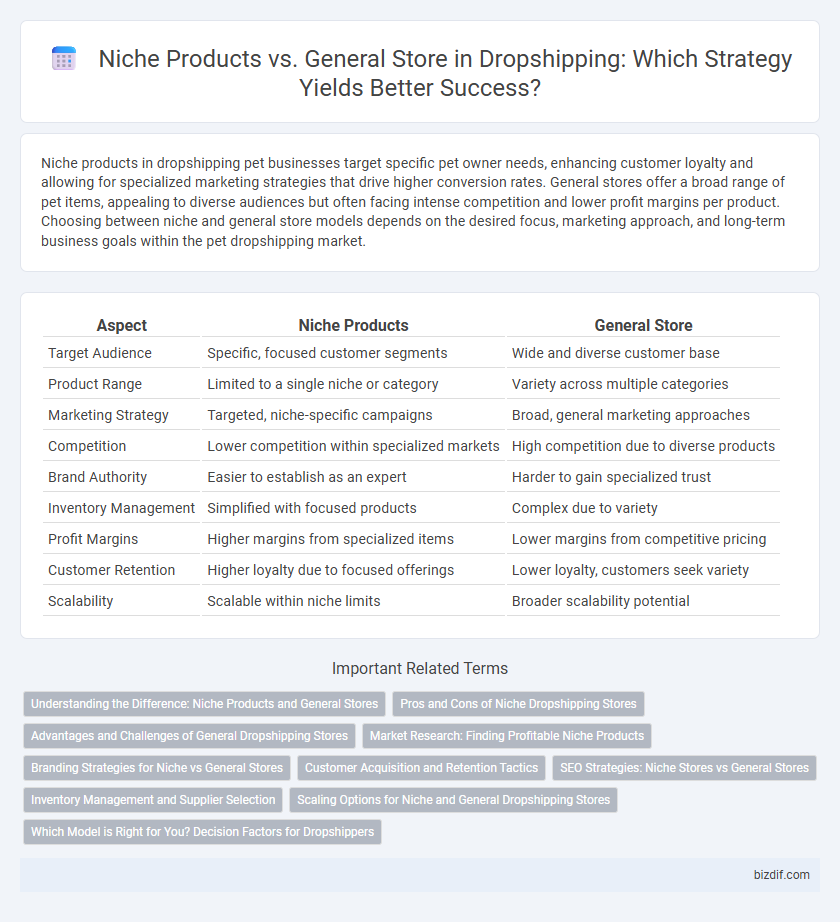Niche products in dropshipping pet businesses target specific pet owner needs, enhancing customer loyalty and allowing for specialized marketing strategies that drive higher conversion rates. General stores offer a broad range of pet items, appealing to diverse audiences but often facing intense competition and lower profit margins per product. Choosing between niche and general store models depends on the desired focus, marketing approach, and long-term business goals within the pet dropshipping market.
Table of Comparison
| Aspect | Niche Products | General Store |
|---|---|---|
| Target Audience | Specific, focused customer segments | Wide and diverse customer base |
| Product Range | Limited to a single niche or category | Variety across multiple categories |
| Marketing Strategy | Targeted, niche-specific campaigns | Broad, general marketing approaches |
| Competition | Lower competition within specialized markets | High competition due to diverse products |
| Brand Authority | Easier to establish as an expert | Harder to gain specialized trust |
| Inventory Management | Simplified with focused products | Complex due to variety |
| Profit Margins | Higher margins from specialized items | Lower margins from competitive pricing |
| Customer Retention | Higher loyalty due to focused offerings | Lower loyalty, customers seek variety |
| Scalability | Scalable within niche limits | Broader scalability potential |
Understanding the Difference: Niche Products and General Stores
Niche products target specific customer segments with specialized interests or needs, offering higher conversion rates through tailored marketing and unique product selection. General stores carry a wide range of products across multiple categories, attracting broader audiences but often facing lower customer loyalty and increased competition. Understanding the difference between niche products and general stores is crucial for dropshipping success, as it influences inventory management, advertising strategies, and profit margins.
Pros and Cons of Niche Dropshipping Stores
Niche dropshipping stores target specific product categories, enabling focused marketing efforts and attracting a dedicated customer base, which often leads to higher conversion rates and stronger brand loyalty. This specialization allows for better product knowledge, streamlined inventory management, and reduced competition compared to general stores, but it may limit sales volume and increase vulnerability to market fluctuations within that niche. Finding the right balance between product variety and specialization is essential to maximizing profitability and minimizing risks in niche dropshipping.
Advantages and Challenges of General Dropshipping Stores
General dropshipping stores offer a broad product range appealing to diverse customer segments, increasing market reach and potential sales volume. Managing inventory and marketing for multiple categories requires robust organizational systems and targeted advertising strategies to maintain profitability. Higher competition and lower niche authority present challenges in building customer loyalty and differentiating from competitors.
Market Research: Finding Profitable Niche Products
Market research for dropshipping emphasizes identifying niche products with targeted demand and low competition to maximize profitability. Utilizing tools such as Google Trends, Amazon Best Sellers, and social media analytics helps uncover consumer preferences and emerging trends within specific niches. Focusing on data-driven insights allows entrepreneurs to select niche products that offer higher conversion rates and customer loyalty compared to general stores.
Branding Strategies for Niche vs General Stores
Niche dropshipping stores benefit from targeted branding strategies by focusing on specific customer demographics, which enhances brand loyalty and facilitates tailored marketing campaigns. General stores require broader branding approaches, emphasizing variety and convenience to appeal to diverse audiences while maintaining consistent messaging across multiple product categories. Effective branding in niche stores relies on deep market research and unique value propositions, whereas general stores prioritize brand recognition and trust through professional design and customer service excellence.
Customer Acquisition and Retention Tactics
Niche products enable targeted customer acquisition by appealing to specific interests and solving unique problems, resulting in higher conversion rates and stronger brand loyalty. General stores attract a broader audience but require diverse marketing strategies and frequent inventory updates to retain customers and maintain engagement. Tailored retention tactics such as personalized email campaigns and exclusive offers are more effective for niche audiences, while general stores benefit from loyalty programs and consistent value-driven promotions.
SEO Strategies: Niche Stores vs General Stores
Niche stores benefit from targeted SEO strategies by focusing on specific keywords and customer intent related to a particular product category, resulting in higher search rankings and more qualified traffic. General stores require broader SEO approaches, targeting a wide array of keywords across multiple product categories, which can dilute keyword relevance and lower overall search engine rankings. Optimizing niche stores for long-tail keywords often leads to better conversion rates compared to the competitive, generic keywords targeted by general stores.
Inventory Management and Supplier Selection
Niche products allow for streamlined inventory management by focusing on a specific category, making supplier selection more targeted and reliable. General stores require a broader range of suppliers, increasing complexity in inventory tracking and potential stockouts. Efficient supplier vetting and real-time inventory synchronization are crucial for both models to maintain customer satisfaction and reduce fulfillment delays.
Scaling Options for Niche and General Dropshipping Stores
Niche dropshipping stores offer targeted scaling opportunities by focusing on specialized products that attract a dedicated customer base, enabling higher conversion rates and customer loyalty. General stores provide broader scaling potential by testing various product categories, allowing sellers to pivot quickly and capture trending markets, though this approach may lead to lower overall conversion rates. Effective scaling in niche stores relies on in-depth market research and optimized marketing strategies, while general stores benefit from data-driven product testing and diversified advertising campaigns.
Which Model is Right for You? Decision Factors for Dropshippers
Choosing between niche products and a general store depends on your target market, marketing skills, and budget. Niche stores cater to specific audiences, offering higher conversion rates and stronger brand loyalty, while general stores cover a broad range of products, attracting diverse customer segments but requiring extensive marketing efforts. Analyze your ability to manage inventory, competition levels, and customer acquisition costs to determine which model aligns best with your dropshipping goals.
Niche Products vs General Store Infographic

 bizdif.com
bizdif.com